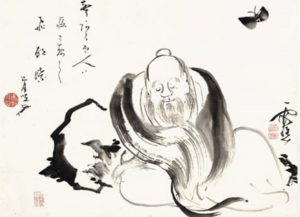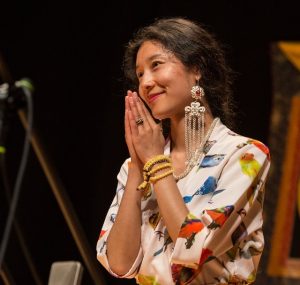
The Korean Seon (Zen) master Venerable Pomnyun Sunim (법륜스님) wears many hats: Buddhist monk, teacher, author, environmentalist, and social activist, to name a few.* As a widely respected Dharma teacher and a tireless socially engaged activist in his native South Korea, Ven. Pomnyun Sunim has founded numerous Dharma-based organizations, initiatives, and projects that are active across the world. Among them, Jungto Society, a volunteer-based community founded on the Buddhist teachings and expressing equality, simple living, and sustainability, is dedicated to addressing modern social issues that lead to suffering, including environmental degradation, poverty, and conflict.
This column, shared by Jungto Society, presents selected highlights from Ven. Pomnyun Sunim’s writings, teachings, public talks, and regular live-streamed Dharma Q+A sessions, which are accessible across the globe. The following teaching was given in Boston on 30 April 2024. This article is the second in a special series taken from Ven. Pomnyun Sunim’s 2024 Dharma tour of Asia-Pacific, Europe, and North America. Titled “Casual Conversation with Ven. Pomnyun Sunim: Come Talk about Life, Wisdom, and Happiness,” the Dharma tour runs from 29 April–21 September 2024, with Dharma talks scheduled in five countries—Australia, Canada, Germany, Japan, and the United States.**
Why do people suffer?
Opening the second talk of his 2024 Dharma tour, Venerable Pomnyun Sunim conveyed his gratitude to the First Church in Belmont, Unitarian Universalist, in Massachusetts which was hosting the Dharma Q&A.
Ven. Pomnyun Sunim: Today, I want to talk about human relationships beyond any specific religious philosophy or ideology. When I ask people how they want to live, most say they wish to live happily and without suffering. When I ask how they are currently living, they often say they are living with stress and suffering. Therefore, one might wonder why we live in suffering if we wish to live without it . . . ?
In ancient times, people believed that suffering was due to the will of heaven or fate. In the East, it is said that one’s destiny is determined by the time of their birth. In South Asia, centered around India, it is believed that one’s suffering in this life is due to the karma accrued from deeds in one’s past lives. This is called fatalism; it means that the life you are living now was predetermined before you were even born.
However, 2,600 years ago, a man named Siddhartha Gautama, who was born in South Asia, questioned this belief. He wondered: “Why do people suffer?” and he explored this question on his own. The Buddha concluded that human destiny is not predetermined but formed, and if you explore the causes of your suffering and remove them, then you can live without suffering.
This state of being without suffering is called nibbana in Pali and nirvana in Sanskrit. The ultimate goal of the Buddha’s teaching is not about being reborn in a better place after death, nor is it about being reborn in better circumstances in a next life; it is about attaining nirvana here and now. If we are suffering, we should not simply endure it, we should personally explore: “Why do we suffer?”
Today’s Dharma Q&A is about the same thing. If you are suffering from any problem, let’s discuss why you are suffering. As we live our lives, we encounter many questions. If you have such questions, we can have a conversation about them. If you have something you want to discuss, we can talk about that. Let’s begin the conversation.
My ex-husband became addicted to alcohol after our divorce
Q: My ex-husband was fine before, but after we divorced he became severely addicted to alcohol. He has been through a lot, and I’ve been through a lot too. He almost died several times. The doctor said that if he continues to drink, he could die within the year. But four weeks ago, something miraculous happened: he willed himself to stop drinking. He has been sober for four weeks. I hope he keeps it up and returns to a normal life.
Ven. Pomnyun Sunim: So, you got divorced?
Q: Yes.
Ven. Pomnyun Sunim: Then, please don’t worry about him. How he lives is up to him. Being overly concerned about your ex-husband is also making you suffer. Crying won’t help your ex-husband. It’s just a waste of your emotions. It doesn’t help at all, but you’re wasting your energy on it. I understand how you feel, but you are being foolish. Do you have children?
Q: Yes.
Ven. Pomnyun Sunim: For the sake of your children, you need to be healthy. Those who will die will die, and those who live must live. The living should maintain their health. Unfortunately, alcohol addiction often ends in death.
Q: My ex-husband is here today, Sunim.
Ven. Pomnyun Sunim: Even if your ex-husband is here, I must speak the truth. If he chooses to drink himself to death, what can you do? Just as we can’t stop people from committing suicide, we can’t stop people from becoming addicted to alcohol. In South Korea, an average of 34 people commit suicide daily. It’s a social phenomenon. You may be able to help someone to reduce the frequency of their drinking, but it’s impossible to make them stop drinking altogether. If he chooses that path, you must respect it. We can suggest that they be treated, but we can’t force them to do it. Just as cancer is a disease, so too is alcoholism. You shouldn’t worry too much.
Q: Now he is getting better, so I want to help him get better.
Ven. Pomnyun Sunim: There is no way for you to help him get better. It’s up to your ex-husband to decide. If he wants to live, he must stop drinking. If he continues to drink, he will eventually die. You need to take good care of your children. If you keep crying over your ex-husband or keep concerning yourself with him, you’ll end up wasting your energy. People might think your concern for your ex-husband is admirable, but in my view, you’re wasting your emotions.
Q: So I should focus on my daughter and myself?
Ven. Pomnyun Sunim: Yes. What can you do if your ex-husband decides to drink and die? It’s fortunate that he is here. If he drinks a lot and dies quickly, the people who are alive can live more peacefully. But if he doesn’t want to die quickly, he must stop drinking.
Alcoholism should be seen as a disease. You might think, “He should just stop drinking,” but it’s not that simple. If a person can stop drinking on their own, then it’s not a disease. It’s a disease because they can’t stop on their own. That’s why your ex-husband needs to be admitted to a hospital to stop drinking. After leaving the hospital, he should attend AA meetings, where alcoholics who want to stop drinking can help one another. These people can start drinking again as the result of just a little stress. People around them may think, “They can just quit drinking. Why do they drink again?” But they can’t control it because it’s an addiction.
There is no one in the world who wants to die. They just can’t control themselves. When they start to drink again, they should be readmitted to the hospital. And if they are able to stop drinking, they should be discharged. Occasionally, some people manage to quit drinking, then they can survive. However, those who can’t quit no matter how hard they try will gradually move toward death.
At this point, there are no other options, so don’t worry too much. A problem that can’t be solved won’t be solved no matter how much you worry. The best way to stop worrying is to wish that he drinks a lot and dies quickly, and be ready to serve him alcohol if he wants it. Then you won’t be distressed even if he drinks and ends up dying. Also, you won’t be troubled even if he lives because that’s a fortunate thing. This is practice. Practice is not being affected whether this happens or that happens.
Q: Thank you.
Exercise your right to lead a happy life
Ven. Pomnyun Sunim: In my view, it seems that none of you know how to properly look after your own interests. That is unwise. Being distressed doesn’t solve anything. It’s merely a waste of your emotions. When you fall, should you sit and cry or should you get up? Sitting and crying doesn’t help to solve the problem. You need to get up and continue walking.
The same applies if you fall again.
It doesn’t matter how many times you’ve fallen, what matters is that you keep getting back up and moving forward. When you reach your destination and look back, it doesn’t make a difference whether you fell once, 10 times, or 100 times. The important fact is that you have arrived. The difficulties you encounter in life aren’t important. The important thing is that you have come this far.
Whatever happens and as long as you are alive, you have the right to live happily. Whether you exercise that right or give up is your choice. I hope you fully exercise your right to lead a happy life.
* Buddhist Monk Ven. Pomnyun Sunim Awarded the 37th Niwano Peace Prize (BDG)
See more
Pomnyun
Jungto Society
JTS Korea
JTS America
International Network of Engaged Buddhists
Related features from BDG
Why Buddhism Is Essential for Modern People
Walking a New Path
Give Peace a Chance
Why Does Suffering Occur?
If We Are Alive Now, We Are All Successful
Leaving the Door to Opportunity Open
Are You Happy?
Related videos from BDG
Dharma Q+A with Ven. Pomnyun Sunim
Wisdom Notes from Ven. Pomnyun Sunim


























